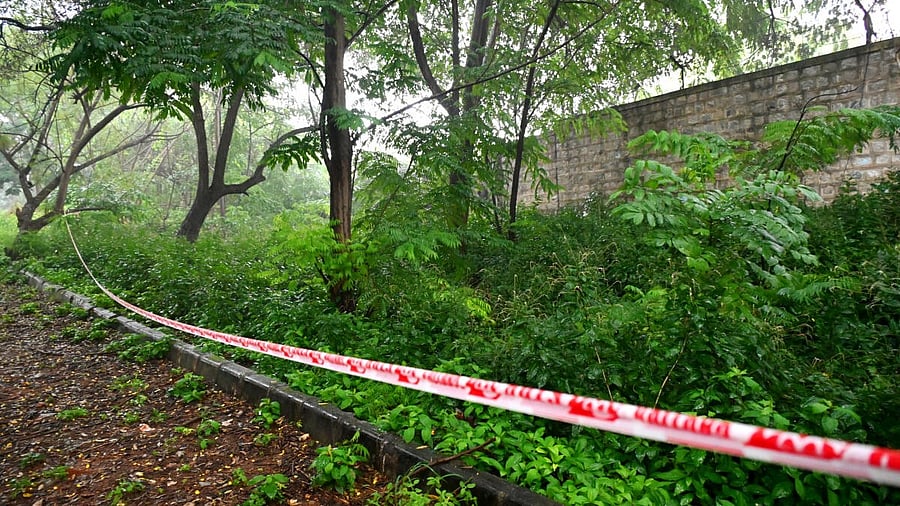
Land inside Lalbagh marked with tape where Greater Bengaluru Authority plans to construct tunnel road in Bengaluru
Credit: DH Photo
Bengaluru: Despite receiving four bids on paper, Bengaluru's 16.74-km tunnel road project may effectively become a two-player race.
Going by the tender conditions placed by the Bengaluru Smart Infrastructure Ltd (B-SMILE), strict safety and financial criteria could eliminate at least two bidders from contention.
Last week, major infrastructure companies such as the Adani Group, Dilip Buildcon, Rail Vikas Nigam Ltd (RVNL) and Vishwa Samudra Engineering submitted bids for the north–south twin-tube tunnel road project, even as many of India’s top tunnelling contractors chose not to participate in the Rs 17,800-crore tender.
Notably absent were firms with the strongest track record in tunnel boring and metro-underground work, including Larsen & Toubro (L&T), Afcons, Hindustan Construction Co (HCC) and Tata Projects, which have handled high-risk, geology-intensive projects similar to the one proposed in Bengaluru.
Among the four bidders who did participate, Dilip Buildcon Limited (DBL) faces a direct challenge with Clause 2.2.1(g) of the tender, which disqualifies any entity — including Special Purpose Vehicles, subsidiaries or affiliates — that has a record of collapse of a bridge, flyover, tunnel, viaduct or metro span in the past five years.
In July 2021, a span of the under-construction Anakapalli flyover in Andhra Pradesh — being built by DBL’s subsidiary Anandapuram Anakapalli Highways Ltd — collapsed, killing two workers. The National Highways Authority of India (NHAI) later imposed a Rs 3-crore penalty, which the company disclosed in a BSE filing.
Other bidders have also faced construction failures, though not all fall under the disqualification clause.
The Adani Group’s Azhiyur–Vengalam Road Ltd saw a highway collapse in Kerala linked to poor soil-nailing and reinforced-soil works, for which the NHAI issued a show-cause notice recommending up to one year’s debarment.
Hyderabad-based Vishwa Samudra Engineering was involved in the six-laning project on NH-66 in Kerala where a retaining-wall failure killed two workers. RVNL, too, saw a part of its NH-66 embankment collapse at Kooriyad, Kerala, which NHAI attributed to inadequate bearing capacity of the foundation soil.
Financial eligibility further thins the field. The tender requires a net worth of Rs 2,192 crore in the financial year 2024–25. According to an Infomerics rating report, Vishwa Samudra Holdings — the group’s holding company — had an adjusted tangible net worth of Rs 1,447.36 crore as of March 2024. While the firm’s 2025 investor brochure cites revenues of Rs 3,950 crore, it does not disclose a corresponding net-worth figure for FY 2025.
Industry experts say that the absence of heavyweights in Bengaluru’s tunnel road shows limited private-sector confidence in the project’s risk–reward balance, especially given that the tunnel will be built on a model requiring the concessionaire to fund 60% of the cost and recover investments primarily through tolls and commercial development.
"A weak response usually means the private sector doesn’t find the project financially or technically viable," a retired bureaucrat said, possibly because the government did not supply adequate information related to soil data and traffic studies for companies to make better assessments of the project. "With limited participation and major tunnelling specialists staying away, the tender risks reduced competition, increasing the possibility of cost escalation and more generous concession terms for the eventual winner."